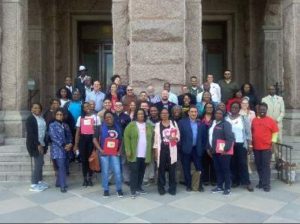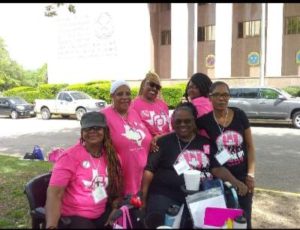 People living with HIV know that one step in leading a healthy life is having access to life-saving medication. What do you do when access to those medications is taken away from the people who most need them? If you are an organizing force like the Texas Strike Force, then you mobilize to save the Texas AIDS Drug Assistance Program (ADAP).
People living with HIV know that one step in leading a healthy life is having access to life-saving medication. What do you do when access to those medications is taken away from the people who most need them? If you are an organizing force like the Texas Strike Force, then you mobilize to save the Texas AIDS Drug Assistance Program (ADAP). The Texas Strike Force is a statewide cross movement of individuals and organizations ready to take action on behalf of marginalized communities and change the face of politics in Texas. The strike force is led by the Rapid Response Team that includes five members of the PWN Texas chapter: Roxanne Glapion, Angela F. Hawkins, Tana Pradia, Jessi Mona Cartwright, and Shelia A. Crockett.
The Strike Force has organized meetings, educated the community on what’s going on, led a coalition of organizations to oppose the changes to ADAP, provided comments and feedback, and participated in DSHS meetings to elevate community concerns. And they won! The Strike Force was successful in getting the state Department of State Health Services to reverse its decision to change income eligibility requirements, and all people living with HIV will continue to receive medications.
PWN interviewed our members in the Rapid Response Team to learn more about what happened, the process, the outcome, and what was most rewarding about working with the Texas Strike Force.
Q. What’s going on with ADAP in Texas?
A. The Texas Department of State Health Services (DSHS) proposed income eligibility changes to the AIDS Drug Assistance Program that provides medications for low-income Texans living with HIV. This change would have prevented 2,700 Texans living with HIV from receiving HIV medications. The Texas Strike Force mobilized to garner public opposition to the proposed changes.
Q. What were your advocacy asks surrounding the ADAP crisis?
A. We had many questions. Here is where we started:
- What are DSHS’s plans for improving budget tracking of THMP funds and staying on top of budget concerns in a more timely manner?
- The Cares Act funds that DSHS received will fund ADAP through August 31, 2021. What is the plan to keep the program sustained after this date?
- What can people living with HIV do if they are denied ADAP?
- What can the community do to stay abreast of budget and program issues in the future?
- How many people are on the waitlist? How is the waitlist being managed and updated? How are people living with HIV being kept informed of waitlist eligibility status and placement on the waitlist?
- How will DSHS be communicating with ADAP clients who were told that they were no longer eligible for the program and that they can rejoin the program?
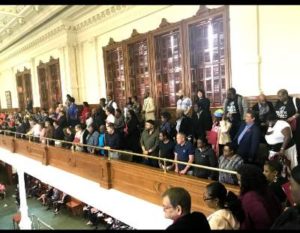 Q. What were the results of your advocacy efforts?
Q. What were the results of your advocacy efforts?A. The Strike Force was successful in getting DSHS to reverse its decision to change income eligibility requirements and all people living with HIV will continue to receive medications and the head of the HIV/STD bureau resigned effective March 19, 2021.
Q. What are the next steps?
A. We will continue to be engaged with DSHS to ensure our community concerns are acted upon. There are 3 key meetings we are preparing for.
- April 30th Texas HIV Medication Program meeting: we are preparing to submit either written or provide oral comments on our outstanding concerns.
- Preparing to participate in a listening session tentatively scheduled for later in May to prepare for the next Partnership Meeting.
- Hold a strike force meeting in May.
- Participate in the next DSHS Partnership Meeting (formerly Town Hall meeting) on June 30, 2021.
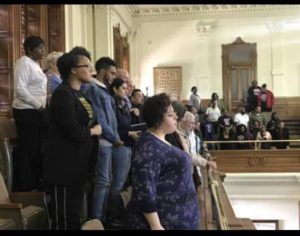 Q. What else is the Texas Strike Force working on?
Q. What else is the Texas Strike Force working on?A. We are monitoring the following bills and continuing to mobilize the community to get involved in the last 5 weeks of the Texas 87th legislative session.
- HB 1165 – Relating to prohibiting abortions after detection of an unborn child’s heartbeat.
- Prohibits abortion after the detection of a fetal heartbeat;
- Fetal heartbeats are typically detected at 6 weeks;
- Texas has continuously worked to limit access to reproductive choices;
- We OPPOSE this bill because it would restrict a person’s bodily autonomy; impact Black, brown, and low-income persons by limiting access to reproductive healthcare.
- HB 369 – Relating to the statute of limitations for an aggravated assault involving communicable diseases.
- Establishes a 5-year statute of limitation for the crime of aggravated assault when committed by a person with a communicable disease;
- Uses specific language “use of bodily fluids” as a deadly weapon that makes it apply to people living with HIV;
- Applies whether a disease is transmitted or not;
- We OPPOSE this bill because it could be used to further criminalize people living with HIV and possible people with COVID.
- HB 1026 – A voter suppression bill that would remove the administration of voter registration from counties and give authority to the secretary of state that we oppose.
- It will make it HARDER for people to register to vote in Texas. There has been no evidence of abuses of the current voter registration system, so all this bill will accomplish is making it unnecessarily difficult for people to want to go register to vote.
- We need MORE opportunities for Texans to register to vote. The Volunteer Deputy Voter Registrars allow ordinary citizens to be deputized to register voters and results in more registered voters. Taking this ability away would result in voter suppression.
- The bill would have a CHILLING EFFECT on immigrant communities, who may fear registering to vote, and having their information shared could put themselves and their loved ones at risk.
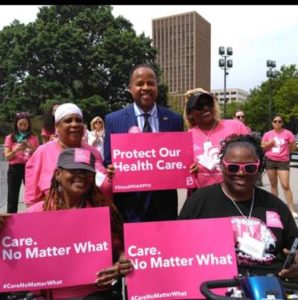 HB 493 – Opt-Out bill that will allow health care professionals to test a person for HIV during a medical screening after obtaining the person’s written consent or verbally informing the person that an HIV test will be performed unless that person “opts-out” of the HIV test. The bill also provides for the coverage of HIV screenings by health plans. In 2018, 4,520 in the state of Texas were newly diagnosed with HIV, which means that every day about 12 Texans were diagnosed with HIV.
HB 493 – Opt-Out bill that will allow health care professionals to test a person for HIV during a medical screening after obtaining the person’s written consent or verbally informing the person that an HIV test will be performed unless that person “opts-out” of the HIV test. The bill also provides for the coverage of HIV screenings by health plans. In 2018, 4,520 in the state of Texas were newly diagnosed with HIV, which means that every day about 12 Texans were diagnosed with HIV.We SUPPORT House Bill 493 because it will:
- Increase the number of people who are aware of their HIV status.
- Identify HIV transmissions earlier, reducing HIV-related deaths.
- Enable people living with HIV to know their HIV status early.
- Allow people to take steps that protect their health so they lead long and healthy lives by getting the appropriate medical care.
- Save money in the long run because the cost of an HIV test is much cheaper than the cost of lifetime treatment for someone living with HIV.
A. The most rewarding part of working with the Strike Force for me is the power we have. The more people who mobilize together, the stronger we are. – Roxanne Glapion, PWN-DFW chapter chair.
The most rewarding thing about being a part of the PWN Texas Strike Force is being able to mobilize our community and our allies and making sure they had everything they needed to take action around issues ranging from ADAP to HB 369. Through action alerts, we’re giving them the tools they needed to mobilize. I love being a part of the change I want to see in a movement of amazing advocates in Texas. – Tana Pradia, PWN Policy Fellow.
The most exciting thing about my involvement in the 87th Legislature was being able to establish relationships with 180+ legislators by sending introductory letters to them alerting them about the existence of the PWN Texas Strike Force. Informing them that the Texas Strike Force are the subject matter experts, and for all things HIV-related, they should call on us. We scheduled meetings with some of those legislators and many reached out to us via email regarding certain bills asking if we are aware of various bills and how they could assist if needed. From a simple letter of introduction, we’ve forged lasting relationships with many of those legislators laying the groundwork for future collaboration as we move toward 2022. I think that’s pretty cool! – Angela F. Hawkins, August 2020 PWN Shero of the Month.
